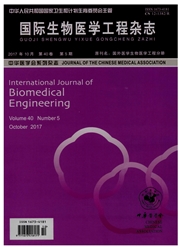

 中文摘要:
中文摘要:
目的 观察吲哚美辛对乳腺癌细胞系MCF-7体外迁移能力的影响,探讨可能存在的机制.方法 采用Transwell实验方法检测吲哚美辛刺激后MCF-7细胞的迁移能力,运用流式细胞术、Real-timePCR及ELISA方法分别检测吲哚美辛刺激后MCF-7细胞中趋化因子受体(CXCR4)、环氧合酶(COX-2)、表皮生长因子受体( EGFR)和血管内皮生长因子(VEGF)的表达情况.结果 吲哚美辛刺激组MCF-7细胞的迁移能力较未刺激组明显降低;吲哚美辛可呈时间-剂量依赖性地抑制MCF-7细胞表面CXCR4的表达,并显著下调细胞中CXCR4、COX-2和EGFR mRNA水平的表达,但对VEGF的产生并无明显的影响.结论MCF-7细胞中CXCR4、COX-2和EGFR表达的显著下调,可能是吲哚美辛抑制MCF-7细胞体外迁移能力的重要机制.
 英文摘要:
英文摘要:
Objective To observe the effect of indomethacin on the migration of breast cancer cell line MCF-7 in vitro and investigate the mechanism involved. Methods The migration of MCF-7 cell line stimulated with or without indomethacin were tested using transwell plates consisting upper and lower chambers separated by Millipore polycarbonate membrance filters with 8μm pore sizes; the levels of chemokine receptor 4 (CXCR4), cyclooxygenase(COX-2), epidermal growth factor receptor(EGFR) and vascular endothelial growth faetor(VEGF) expression in MCF-7 eel1 line were detected by flow cytometry, Real-time PCR and ELISA, respectively. Results Indomethacin decreased the migration ability of MCF-7 cell line significantly. CXCR4 membrane expression was significantly reduced in a time-dose dependent manner, and CXCR4, COX-2 and EGFR mRNA levels were significantly downregulated after indomethacin stimulation. However, exposure to indometahcin had no major effect on VEGF production of cells. Conclusion The downregulation of CXCR4, COX-2 and EGFR expression might be the primary mechanism involved in the inhibitory effect of indomethacin on the migration of MCF-7 cell line.
 同期刊论文项目
同期刊论文项目
 同项目期刊论文
同项目期刊论文
 期刊信息
期刊信息
